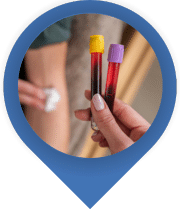The Latest Healthcare News
Check out our blog to learn more from our team about the latest medical advancements, health tips, and primary care news.

At AllCare, we understand how anxiety can disrupt your life. That’s why we offer comprehensive mental health services from a team of compassionate experts who can help diagnose what causes anxiety. Then, we’ll work with you to develop a personalized plan for anxiety relief so you can live a happier, more fulfilling life.
Feelings of dread, uneasiness, or a pit in the stomach. A rapid heart rate, restlessness, or sweating. These can all be signs of anxiety, which affects nearly all of us during our lives. For some, it happens before a big test or a job interview. For others, it can occur when faced with a difficult work situation or an important life decision. Anxiety may be a normal part of life, or it may be something that happens now and then. It can make you withdraw from friends and activities you love, make concentrating on simple tasks difficult, or create obsessive thoughts that can lead to depression. When anxiety attacks become more frequent, feel more intense, or affect your everyday life, it’s time to seek anxiety help.
At AllCare, we provide an empathetic, comprehensive approach to treating anxiety. From anxiety therapy and telehealth to coping techniques and anxiety medication, we’re here to make getting care for your anxiety easy and convenient, ensuring your comfort every step of the journey.

There are several types of anxiety disorders, and each one has its own unique symptoms and triggers. Some types of anxiety conditions include:
Excessive fear and worry are the main symptoms of nearly every anxiety disorder. However, specific symptoms may vary depending on the type of anxiety disorder. Common anxiety symptoms include:

Our psychiatry-trained nurse practitioners are here to evaluate your symptoms and determine the best treatment for anxiety. Depending on the treatment plan, anxiety medication like antidepressants or other psychiatric medications may be prescribed during these visits.

We’ll perform a vitals check, including heart rate, blood pressure, and respiration rate. And we’ll discuss your symptoms and family history. We’ll also do a mental health evaluation.

Our individual anxiety therapy sessions provide a safe and confidential space for you to explore your thoughts, emotions, and behaviors. Through personalized counseling, our experienced therapists help you gain self-awareness, develop coping strategies, and navigate life’s challenges to foster personal growth and well-being.

At AllCare, we offer specialized support for individuals dealing with anxiety and depression. Our therapists employ evidence-based techniques to help you manage symptoms, develop healthy coping mechanisms, challenge negative thought patterns, and promote emotional well-being. We provide a compassionate and supportive environment to help you regain control and lead a more fulfilling life.

Our comprehensive anxiety disorder treatment caters to individuals diagnosed with obsessive-compulsive disorders (OCD) through a tailored approach to anxiety management.
An anxiety attack is an intense episode of overwhelming fear or worry that typically arises suddenly, often in response to a perceived threat or stressor. During an anxiety attack, a person may experience a range of symptoms, such as:
Unlike panic attacks, which often occur unexpectedly, anxiety attacks tend to build up gradually and may be linked to a specific trigger, like social situations, health concerns, or stressful events. Anxiety attack treatment can provide relief and help people regain a sense of control.

Experience the convenience of telehealth appointments at AllCare. Our telemedicine services are designed to provide you with seamless access to healthcare without the need to leave your home. Whether you need an online doctor’s appointment for immediate or primary care, AllCare’s got you covered. With our online telehealth services currently available to individuals located in Virginia, Maryland, and Washington, D.C., you can connect with our experienced immediate and primary care physicians via secure video calls.
At AllCare, we are expanding our virtual healthcare access to all services previously offered in person. This includes:
No matter what type of anxiety disorder you have, it can make you feel trapped in a vicious cycle of irrational fear, hopelessness, and dread. Although everyone experiences stress and anxiety to some degree, it’s time to seek professional help when your anxiety feels unmanageable. People who can benefit from our anxiety relief treatments include:
Anxiety is the fear that something could happen, even if there are no definitive reasons to worry. It can be mild or severe and affects people of all ages. There are several anxiety disorders that have similar symptoms, but the root cause is different.
In order to diagnose the type of anxiety you have, a physician or mental health specialist will ask you a series of questions to determine which disorder best fits the symptoms you’re experiencing. Because some anxiety symptoms mimic other diseases, you should see your primary care physician to rule out any other conditions.
While anxiety disorders cannot be prevented, they usually respond well to treatment. Some self-coping skills may include:
Anxiety attacks and panic disorders are different disorders. While they share many of the same symptoms, there are some differences that set them apart, including:
Yes, anxiety can cause temporary spikes in blood pressure due to the body’s “fight or flight” response. When you feel anxious, your body releases stress hormones like adrenaline and cortisol, which increase heart rate and constrict blood vessels, raising blood pressure for a short time. However, while these anxiety-related spikes are typically temporary, chronic anxiety or frequent episodes of stress can contribute to longer-term high blood pressure (hypertension) over time, especially when combined with other risk factors such as poor diet or lack of exercise.
For ongoing high blood pressure, it’s best to talk with a healthcare provider, as they can help determine if it’s related to anxiety or another underlying cause.
At AllCare, we’re proud to deliver exceptional primary and immediate care to residents across Virginia, Maryland, and Washington D.C. From bustling city centers to serene suburban neighborhoods, our clinics are strategically placed for your convenience and care. Experience top-tier Anxiety Treatment in your community with AllCare, where your health is our priority.
Check out our blog to learn more from our team about the latest medical advancements, health tips, and primary care news.
Seasonal Affective Disorder (SAD) represents a significant mental health concern affecting approximately 5% of adults in the United States. This […]
Read More >Mammograms save lives. Early detection of breast cancer through proper screening will give a patient a remarkable 99% five-year survival […]
Read More >Most people are aware that diet, exercise, and genetics affect cholesterol levels. But can stress raise your cholesterol? The answer […]
Read More >Our related healthcare services extend beyond immediate care to include preventive care such as routine physical exams, chronic disease management for conditions like diabetes, and specialty care referrals for more complex health issues.